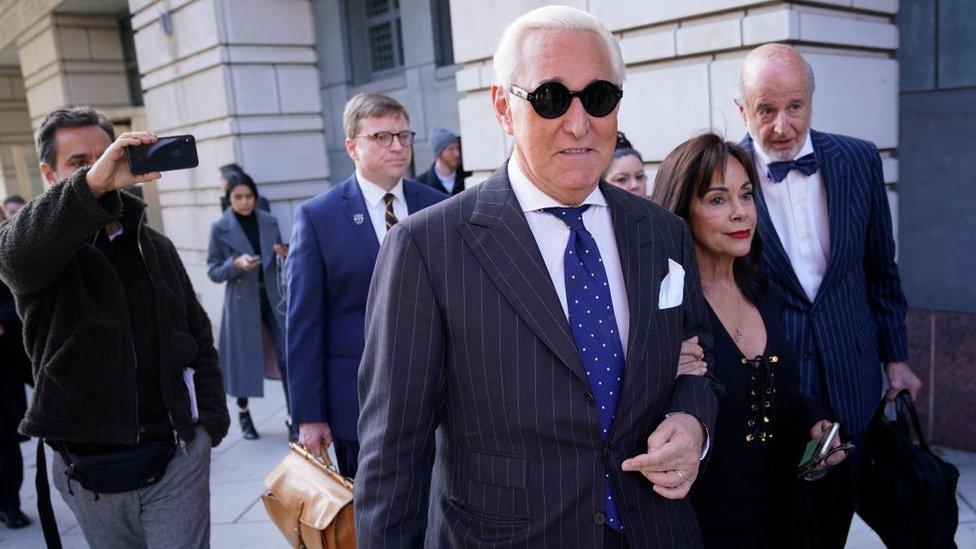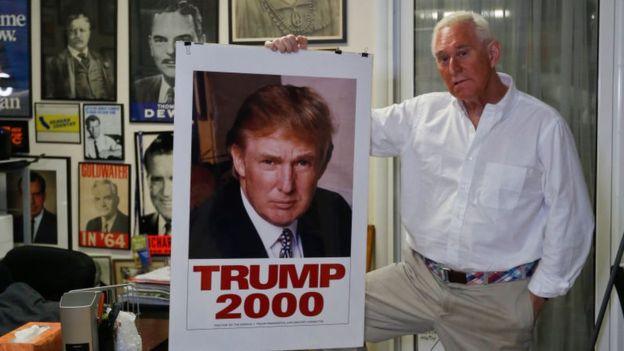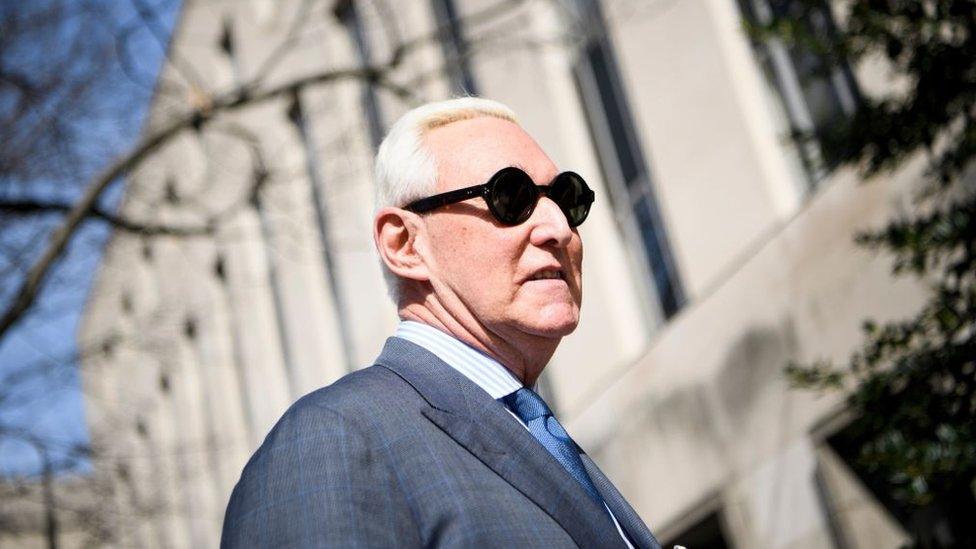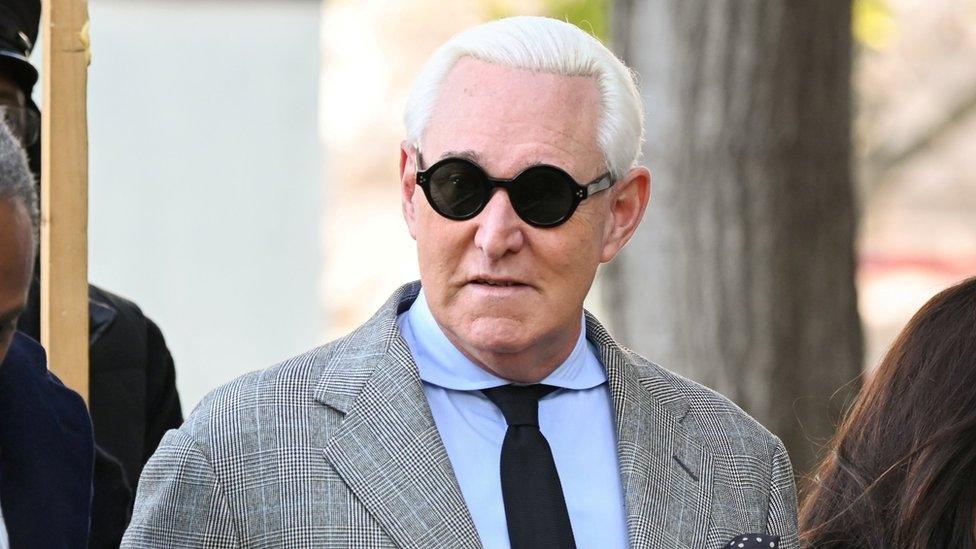Roger Stone: Critics blast Trump for commuting ex-adviser's jail term
- Published
Roger Stone speaks to reporters reacting to Trump's decision to grant clemency
Leading Democrats have condemned US President Donald Trump's decision to commute the prison sentence of his former adviser and friend Roger Stone.
Presidential contender Joe Biden's spokesman accused Mr Trump of abuse of power and "laying waste" to US values.
The move - sparing Stone from jail but not a pardon - came just after a court denied Stone's request to delay the start date of his 40-month prison term.
He was convicted of lying to Congress, obstruction and witness tampering.
Stone was the sixth Trump aide found guilty on charges linked to a justice department probe that alleged Russia tried to boost the Trump 2016 campaign.
The 67-year-old had been due to report to a federal prison in Jesup, Georgia, next Tuesday.
The White House said Stone was the victim of an attempt by opponents to undermine the presidency.
The president has been accused by political critics of undermining the justice system by criticising criminal cases against Stone and other former aides.
Mr Trump has also publicly complained about the prosecutions of onetime campaign chairman Paul Manafort and former White House National Security Adviser Michael Flynn.
What has the reaction been?
Mr Biden's spokesman Bill Russo said Mr Trump could not be shamed and could only be stopped at the ballot box.
"President Trump has once again abused his power, releasing this commutation on a Friday night, hoping to yet again avoid scrutiny as he lays waste to the norms and the values that make our country a shining beacon to the rest of the world," he said.
House of Representatives Intelligence Committee Chairman Adam Schiff condemned Mr Trump's clemency.
"With this commutation," said the top Democratic lawmaker, "Trump makes clear that there are two systems of justice in America: one for his criminal friends, and one for everyone else."
Democratic Senator Elizabeth Warren said it showed Donald Trump was the most corrupt president in history.

Roger Stone has maintained all along that the case against him was politically motivated
But the president's personal lawyer, Rudy Giuliani, welcomed the news, saying Roger Stone's sentence was draconian.
Mr Stone himself told reporters that under the terms of the commutation he could now appeal against his sentence, and was confident that he could expose "an enormous amount of corruption" at his trial.
What did the president say?
The White House said in a statement: "Roger Stone is a victim of the Russia Hoax that the Left and its allies in the media perpetuated for years in an attempt to undermine the Trump Presidency."
It said that Department of Justice prosecutors under special counsel Robert Mueller only charged Stone out of frustration after failing to prove the "fantasy" that the Trump campaign had colluded with the Kremlin.
The White House also suggested that the FBI had tipped off CNN about their pre-dawn raid on Stone's house, noting that a camera crew for the cable network was on the scene to record the arrest.
"Roger Stone has already suffered greatly," the statement said. "He was treated very unfairly, as were many others in this case. Roger Stone is now a free man!"
Mr Trump had been hinting about a reprieve for Stone for months, including on Thursday night in an interview with a Fox News host.


Helping a loyal friend, critics be damned
It's hard to say the president's decision to grant clemency to his long-time friend and political counsellor is surprising, but it's still jarring. Even though the president has called the special counsel investigation that prosecuted Stone a sham and a partisan witch hunt, Stone was duly convicted of serious crimes.
Meanwhile, Stone's active lobbying for a commutation, recently saying that he could have "easily" turned on the president to avoid trial, was unseemly at best.
Mr Trump is not the first president to issue controversial pardons or commutations for friends and associates, of course. Most of his predecessors, however, waited until the last days of their presidency to take such actions, as they knew the political firestorms they would generate.
Mr Trump, on the other hand, seems to relish the controversy. Like much of his time in office, his actions are done with an eye toward a base that views inciting political opponents as an end to itself.
While the action will be sharply criticised, at this point in the Trump presidency his critics and his allies appear pretty much set in stone. Giving Stone a reprieve won't win Mr Trump any new support, but that's not the point. He's helping a loyal friend, critics be damned.

What was Stone convicted of?
The president's commutation does not void a criminal conviction as a pardon does.
Stone was found guilty of lying to the House Intelligence Committee about his attempts to contact Wikileaks, the website that released damaging emails about Mr Trump's 2016 Democratic election rival Hillary Clinton.
US intelligence officials have concluded the messages were stolen by Russian hackers.
Stone had acknowledged during the 2016 campaign that he was in contact with Wikileaks founder Julian Assange.
He also intimated that he knew the website would disclose more than 19,000 emails hacked from the Democratic National Committee servers.
Trump: 'I'd love to see Roger Stone exonerated'
Stone's sentence fell short of an initial seven-to-nine-year recommendation from prosecutors.
In a remarkable move, US Attorney General William Barr had overruled that sentencing guideline following a Trump tweet, and instead recommended a more lenient punishment.
That intervention led to the entire Stone prosecution team resigning from the case.
Who is Roger Stone?
Stone has worked with Republicans since the 1970s and has a tattoo of Richard Nixon on his back.
In the 1990s, Stone worked as a lobbyist for Mr Trump's casino business, and later helped Mr Trump's unsuccessful White House run in 2000.
According to the Netflix documentary Get Me Roger Stone, the strategist reportedly encouraged Mr Trump to run for the presidency again.

Stone helped Donald Trump in his failed bid for the presidency in 2000
- Published20 February 2020

- Published24 December 2020
